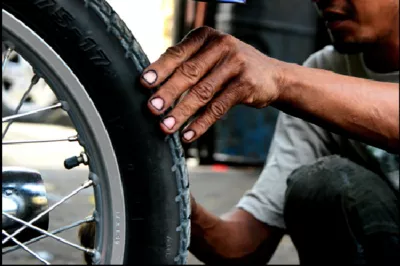Defaults Versus Over-indebtedness in Morocco
Microcredit borrowers don’t default only when they are unable to repay their loans. As noted in a recent post by Isabelle Guérin on current default patterns in the Indian state of Tamil Nadu, individual or collective defaults also result when credit providers lack or lose legitimacy and borrowers are not willing to repay, as I will show with recent data (110 qualitative interviews) from rural and urban Morocco. Also highlighted by Isabelle Guérin, defaults are not only the result of borrower’s repayment incapacity but also by the lack of legitimacy of credit providers that translates into some individual or collective unwillingness to repay loans.
While in urban areas the first reason for default mentioned by clients is related to default of another loan group member, many urban clients who defaulted also faced unexpected adverse shocks related to health, divorce, loss of livelihood, and natural disasters.
The limited mitigating role of informal finance
In other contexts, microfinance customers might have tapped informal sources of finance to help absorb these unexpected shocks. In Morocco, however, informal credit options are more limited. Over-indebtedness is revealed more quickly than in contexts like Tamil Nadu where most household debt comes from non-MFI sources and the sums available from informal sources are much larger. When Moroccan MFI clients face liquidity problems, informal credit is largely missing and they turn to multiple borrowing from MFIs.
Strategic defaults by individuals or on a “mass” level are also explained by the relationship between customers and the MFI as well as clients' perceptions of the consequences of default. Individual defaults are explained by weak links between many clients and their MFI and clients’ perceptions that the consequences of non-repayment are not so serious.
This arises as a result of:
- High competition among microcredit providers;
- Homogeneous offers: multiple institutions offering the same products and same lending methodology;
- Inability of MFIs to sue the defaulters due to a lack of a legal framework and reluctance by the public authority to support MFIs;
- And until recently a weak social insertion of the MFIs in their local environment: With a top-down approach, microcredit providers do not seek to interact with local populations and local authorities.
In several villages that we studied, microcredit is perceived as a non-repayable debt, because microcredit programs are perceived as coming from the state, resulting in both massive participation and strategic default. In that context households do not hesitate to borrow as they don’t fear any sanction in case of non-payment. This depends on credit officers’ capacity to build close relationships with clients and this has to do with their integration within the local social context. Another factor is related to the role played by leaders who negatively influence the image of microcredit and do not hesitate to call for non- payment.
In addition, in urban areas, weak solidarity among group members is a major cause of defaults: people find it unfair to pay back for the defaulter so they all refuse to repay and do not really fear to lose access to credit (they argue that borrowing microloans brings more troubles compare to well-being improvement)
Implications
- In analyzing over-indebtedness, it is important to take into account whether or not the informal financial sector plays a significant role (no in Morocco, yes in Tamil Nadu and other parts of south India).
- The clients' perception of the MFI can play a far more important role in repayment behavior than we have typically assumed. MFIs must focus on this aspect to prevent or reduce individual and/or collective strategic defaults.
- Our findings further reinforce the conclusion that savings could play a key role, not only by “topping up” credit offers that are too small or inflexible, but by reinforcing the link and loyalty between the MFI and its clients. (Note that in both Morocco and Tamil Nadu non-bank MFIs are prohibited by regulation from offering deposit services).
----The author is Assistant Professor at the Department of Political Economy, University of Fribourg, Switzerland.
Related publications:
Crépon, B., Devoto, F., Duflo, E., Pariente, W. (2011). Impact of microcredit in rural areas of Morocco: Evidence from a Randomized Evaluation. Working paper, J-Pal, March 31, 2011. Available at:http://www.povertyactionlab.org/publication/impact-microcredit-rural-areas-morocco-evidence-randomized-evaluation
Morvant-Roux S., Guérin I., Roesch M.,Moisseron J-Y. (Forthcoming) ”Adding value to randomization with qualitative analysis: the case of microcredit in rural Morocco’, World Development à Working paper available at : http://www.microfinance-in-crisis.org/wp-content/uploads/WP2.pdf




Add new comment